A discussion about the haunting 1957 East German film The Singing Ringing Tree, first broadcast in the UK in the 1960s by the BBC in a serial format, led me back to the BBC’s Tales from Europe shows of the 1960s – and the fondly-remembered The White Horses, featuring one of the most memorable TV theme tunes of the time, perhaps all time, originally sung by Jackie Lee.
The initial and continued success of the short-lived show when first broadcast, and in repeats, surely helped encourage the production similarly-themed series such as The Adventures of Black Beauty and Follyfoot – the latter of course give comics life in Look-In, with art from the late Mike Noble.
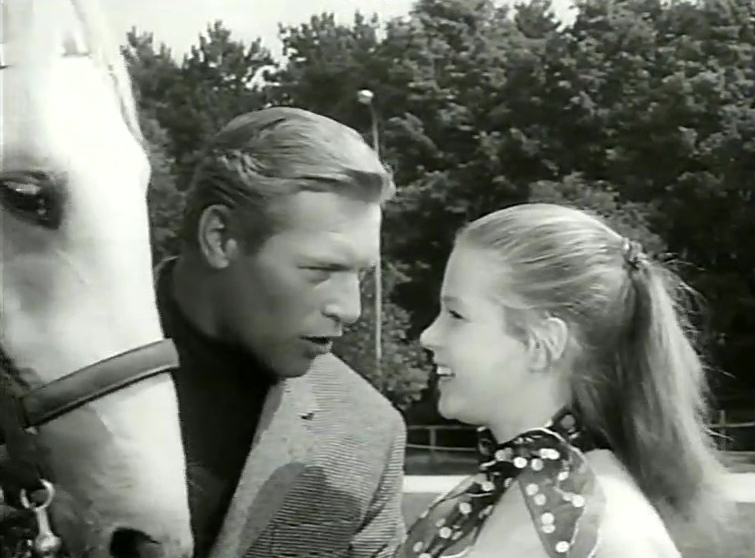
A scene from “The White Horses”
The White Horses was first broadcast in 1965 co-produced by RTV Ljubljana (now RTV Slovenija) of Yugoslavia and German TV (Südwestfunk). A dubbed version was broadcast by the BBC from 1968, and often repeated; audio tapes of 12 of the 13 episodes have been found of these (the dubbed versions of the show itself long thought lost), and are now available as a special DVD from this The White Horses fan site, which offers plenty of information on the show.
The White Horses follows the adventures of a teenage girl Julia (played by Helga Anders) who leaves Belgrade to spend a holiday on a stud farm run by her Uncle Dimitri (Helmuth Schneider), where with the help of head groom Hugo (Franz Muxeneder), white Lipizzaner horses are raised.
The theme song to the German version was played by Ivo Robić, but it’s the UK version, written by Michael Carr and Ben Nisbet, simply titled “White Horses”, that continues to delight decades on. Originally credited to “Jacky”, it was sung by Irish-born Jackie Lee, became a top 10 hit in the UK charts in April 1968 and has been covered many times. (I even persuaded a ringtone company to adapt it back in the 2000s).
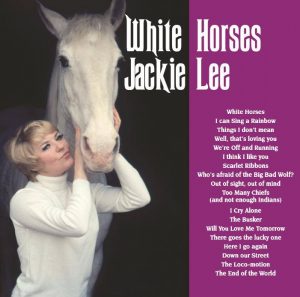 “I never dreamt, in my wildest dreams, that when I was asked by Ben Nisbett and Micheal Carr if I would like to sing a little song they had written for, hopefully, a new TV series about White Horses, that it would become so popular,” Jackie, whose credits also include the theme for the animated The Adventures of Rupert the Bear, recalls.
“I never dreamt, in my wildest dreams, that when I was asked by Ben Nisbett and Micheal Carr if I would like to sing a little song they had written for, hopefully, a new TV series about White Horses, that it would become so popular,” Jackie, whose credits also include the theme for the animated The Adventures of Rupert the Bear, recalls.
“I of course said I would be delighted to do so. I then went to Ben’s office in Tin Pan Alley as it was known – Denmark Street, London – and heard the song, and saw the lyrics for the first time. I must say I fell in love with it.
“…I am quite astounded that my recording of the White Horses theme song is still being played and much sought after,” she continues. “So many people have written to me personally to recall all the happy memories they remember as children about the series and my recording.”
I’m sure The White Horses helped bring us other horse-themed shows on British TV, to the delight of millions, and inspired many a girls comic strip, too
Contrary to the belief of some, The White Horses was not part of the programming that formed the long-running Tales From Europe segment of children’s programming on BBC, broadcast from 1964 until 1969 on Thursdays at 5.25pm or 5.30pm after Blue Peter and before the 6.00pm news.
These European fantasy and adventure tales, dubbed from their European, Soviet and even Mongolian originals, included the memorably haunting The Singing Ringing Tree and The Snow Queen, were introduced to viewers by Peggy Miller.
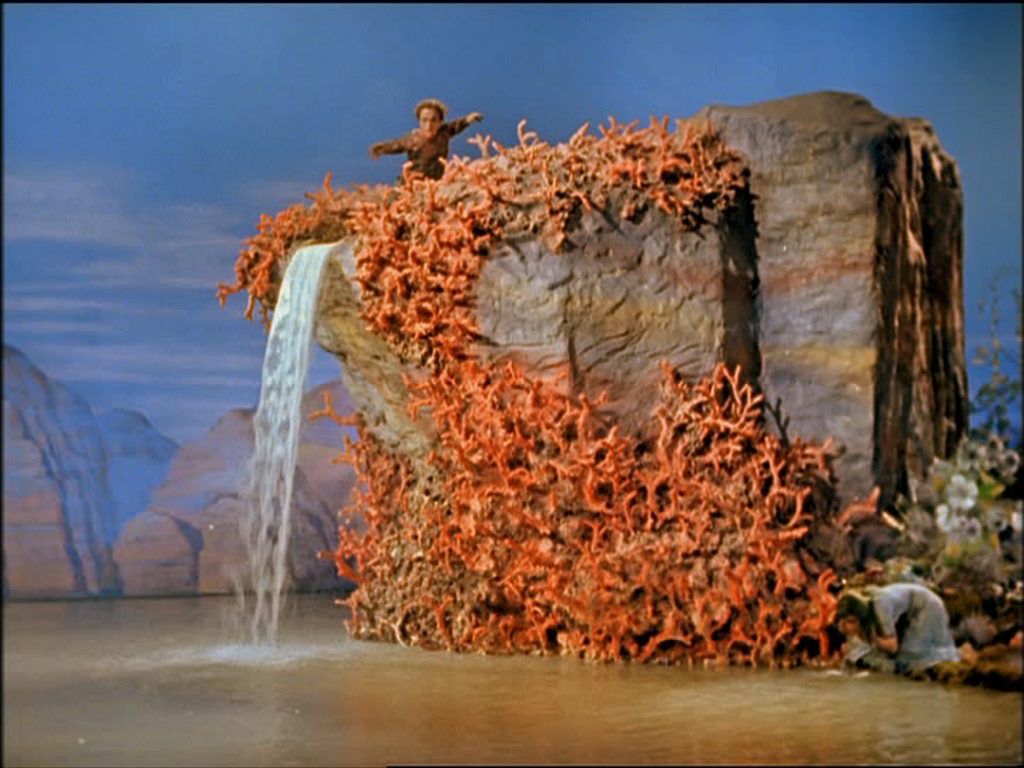
A scene featuring Richard Krüger in a brilliant performance from The Singing Ringing Tree, 1957, directed by Francesco Stefani
Some of the stories were repeated after the 1960s, often in colour, but not as part of Tales From Europe. It’s my understanding many of these are Missing Believed Wiped, but The Singing Ringing Tree (a beautifully filmed, loose re-telling of the Grimm’s fairy tale, “Snow White and Rose Red”, complete with scary dwarf played by Richard Krüger), has been released in its original movie format, as first produced in East Germany in 1957.
“It was a forerunner of Star Wars and came full circle with Peter Jackson’s Lord of the Rings and Hobbit films, where visuals are woven into parable, recalls UKTV drama commissioning editor Philippa Collie Cousins, who was hugely influenced by the show when it was first aired “I still love that combination of trash, imagination, subtext and sophistication with really interesting visuals, the quest for something we haven’t seen before.”
The Tales from Europe project sprang, initially, through an administrative anomaly. In an article for The Telegraph published in 2002, when The Singing Ringing Tree was re-issued on DVD, Mark Hudson notes that, for a brief period in the early 1960s, the children’s programmes department was unable to make drama programmes of its own, and was forced to scout round foreign film festivals for suitable material.
Much of what they found had a poetic resonance that British television has only rarely achieved, principally because they were made not by television companies, but by their respective countries’ national film industries, which were all heavily subsidised.
“The Eastern Europeans were making first-class feature films for children,” former head of children’s programmes, Edward Barnes told Hudson. “And they didn’t ask very much for them.
“We would re-edit them into short series, and, because we couldn’t afford dubbing, we’d add narration over the dialogue. This became virtue from necessity, because the viewers could hear the original language and it gave them a taste of other cultures and other worlds.”
Of course, some were also wonderfully re-dubbed and spoofed, for example, by The Fast Show with “Der Swinginginen Ringinen Plinginen Tingingen Plinkingen Plonkingen Boingingen Triee“.
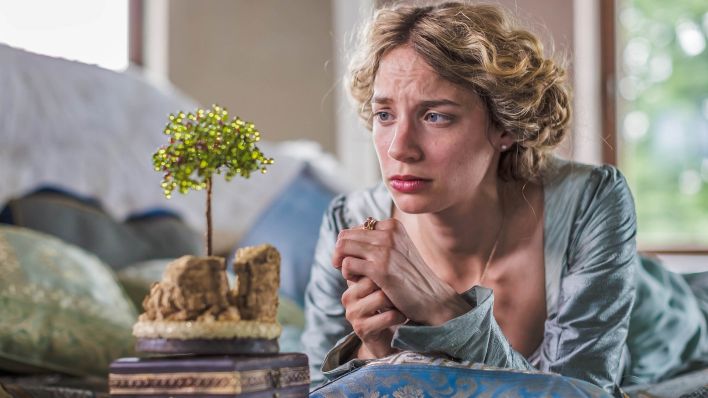
Jytte-Merle Böhrnsen longs for the singing, sounding little tree in the 2016 German remake of the original 1957 film “The Singing, Ringing Tree”
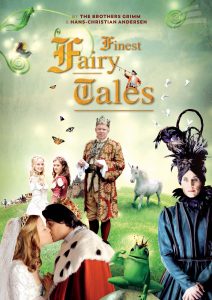 The Singing Ringing Tree has since been re-made, in 2016, as part of the German series Finest Fairy Tales, starring Jytte-Merle Böhrnsen as the Princess, which is available in English, French and German.
The Singing Ringing Tree has since been re-made, in 2016, as part of the German series Finest Fairy Tales, starring Jytte-Merle Böhrnsen as the Princess, which is available in English, French and German.
Christel Bodenstein, who played the princess in the original DEFA film adaptation, cameos in the role of herbalist and if you look carefully, you might see a picture of her from the original as a portrait of the Queen.
Produced by ARD The Finest Fairy Tales offers over 40 of the best and most well-known fairy tales from the Brothers Grimm and Hans Christian Andersen, the films were shot at castles and in forests all over Germany. Just like the originals, they have been a hit in Germany for several years.
However, although widely screened across Europe, including in France, it seems that they have yet to gain a UK sale – although they are offered to schools through the German Goethe Institute.
Perhaps the BBC should take an other look at them…
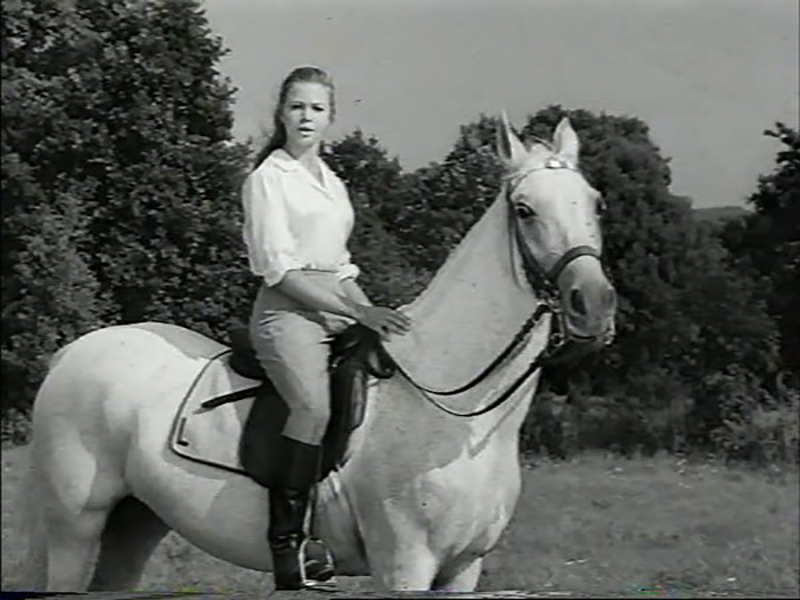
WEB LINKS
While the BBC version is, all but one episode, lost, you can obtain sets of original translations subtitled into English. All the 13 English subtitled episodes, plus the only remaining episode “13 English dubbing” cost £22.50 (revised July 2015 price) inc postage and packing. If you would like one just mail the seller at thewhitehorses@hotmail.com – web site at https://thewhitehorsestvseries1968.wordpress.com
• Jackie Lee is online at www.jackielee.org | White Horses is available on Amazon here
In common with many other female singers from the 1960s, Jackie Lee recordings are now collected by fans of ’60s girls and Northern Soul who are brave enough to look beyond the famed White horses. Although Jackie had little commercial success – just two hits in Britain – this is a poor indication of her stature in the British music business, particularly during the 1960s. She lived and breathed music from her childhood in Ireland to her early retirement in 1973. Jackie made many marvellous recordings in a twenty year career and her name crops up in some unlikely places.
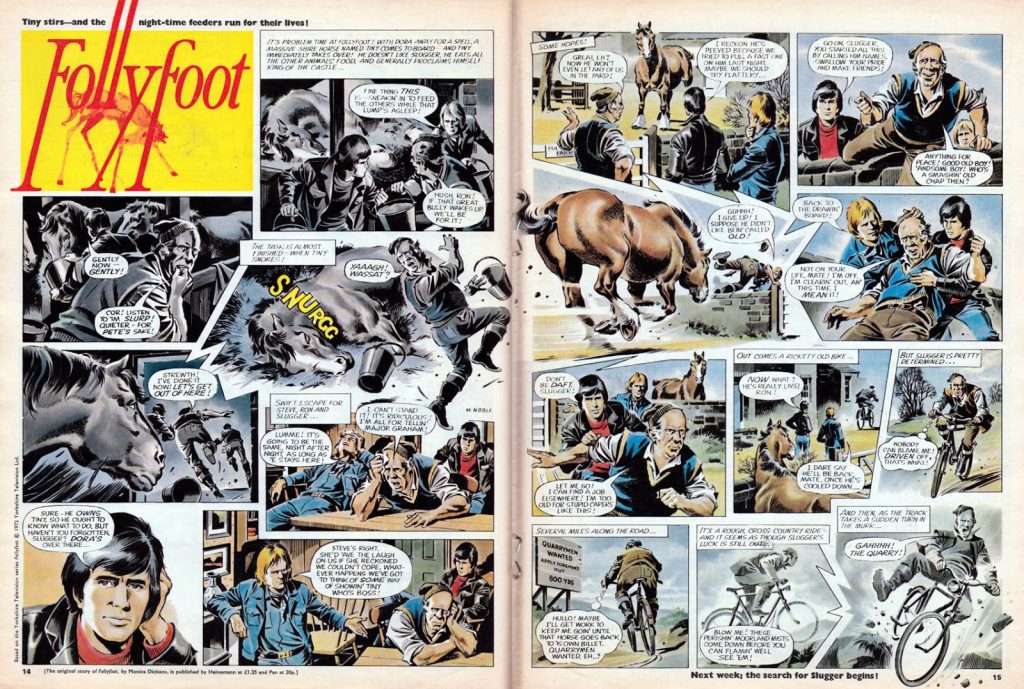
A typically accomplished episode of “Follyfoot” for Look-In by Mike Noble (Issue 11, 1972). With thanks to Lew Stringer
• Wikipedia: The White Horses | The Adventures of Black Beauty | The New Adventures of Black Beauty } Follyfoot | The Singing Ringing Tree
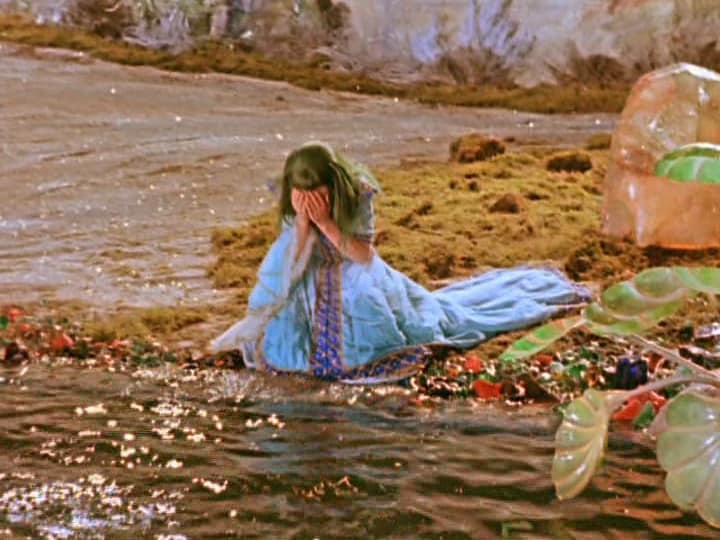
Christel Bodenstein as the princess in the original “The Singing Ringing Tree”, directed by Francesco Stefani (1957)
TALES FROM EUROPE
• Tales from Europe: Story List and original Broadcast Dates
• The Singing Ringing Tree Fan Site
• The Shows That Shaped Me: Philippa Collie Cousins on The Singing Ringing Tree
“The combination of Tolkien’s storytelling in print and the telly visuals of The Singing Ringing Tree were truly odd, disturbing and very romantic. They were what made me fall in love with story, becoming a voracious reader of novels and poetry.”
• The Telegraph: Return of the teatime terror by Mark Hudson (30th March 2002)
• The Goethe-Institut London offers a touring exhibition consisting of fairy tale posters and teaching materials to British schools and The Finest Fairy Tales are available in German with English subtitles for schools
• Missing Believed Wiped Facebook Group
A group to spread the word about the ‘lost’ classics of television, film and radio and maybe even find a way of plugging some of the gaps. Have you, or your parents or grandparents, got a collection of Film Reels tucked away in an attic or shed somewhere, gathering dust? Did someone in your family have one of the earliest video recorders in the late 1960s?
[amazon_link asins=’B0068M11N4,B01NCU7WM4,B00005LW4C,B000PFT1NM,B01L1P2G9K’ template=’ProductCarousel’ store=’downthetubes’ marketplace=’UK’ link_id=’152c5e29-f2a6-4304-b75f-80e1517d2fc9′]
The founder of downthetubes, which he established in 1998. John works as a comics and magazine editor, writer, and on promotional work for the Lakes International Comic Art Festival. He is currently editor of Star Trek Explorer, published by Titan – his third tour of duty on the title originally titled Star Trek Magazine.
Working in British comics publishing since the 1980s, his credits include editor of titles such as Doctor Who Magazine, Babylon 5 Magazine, and more. He also edited the comics anthology STRIP Magazine and edited several audio comics for ROK Comics. He has also edited several comic collections, including volumes of “Charley’s War” and “Dan Dare”.
He’s the writer of “Pilgrim: Secrets and Lies” for B7 Comics; “Crucible”, a creator-owned project with 2000AD artist Smuzz; and “Death Duty” and “Skow Dogs” with Dave Hailwood.
Categories: Digital Media, downthetubes News, Links, Other Worlds, Television
 WebFind: 4K 1960s Doctor Who – and The Colorization Channel
WebFind: 4K 1960s Doctor Who – and The Colorization Channel